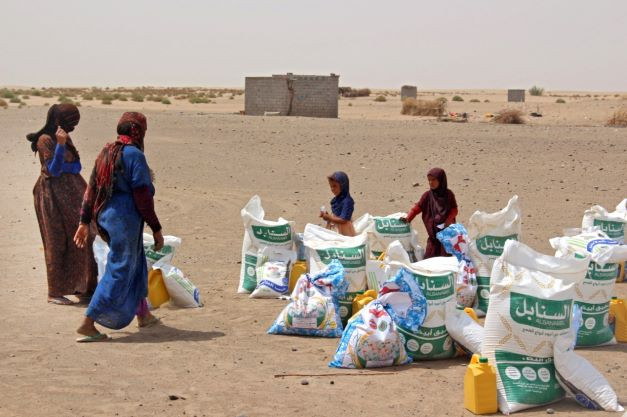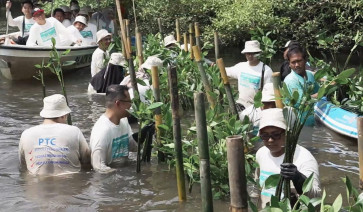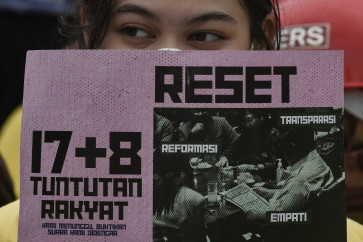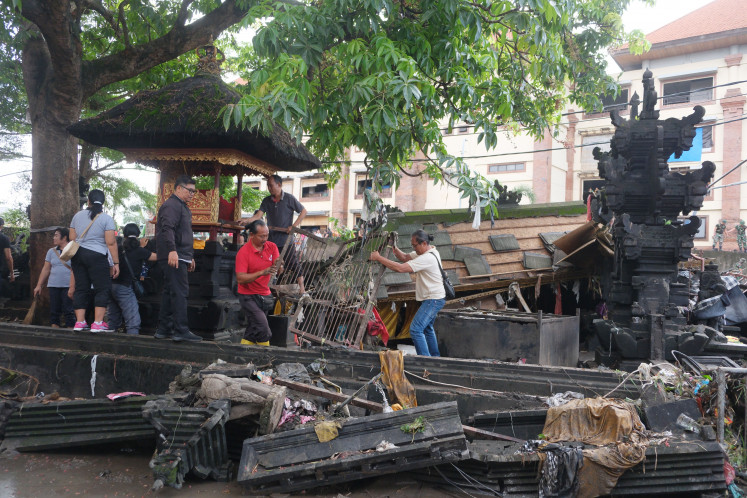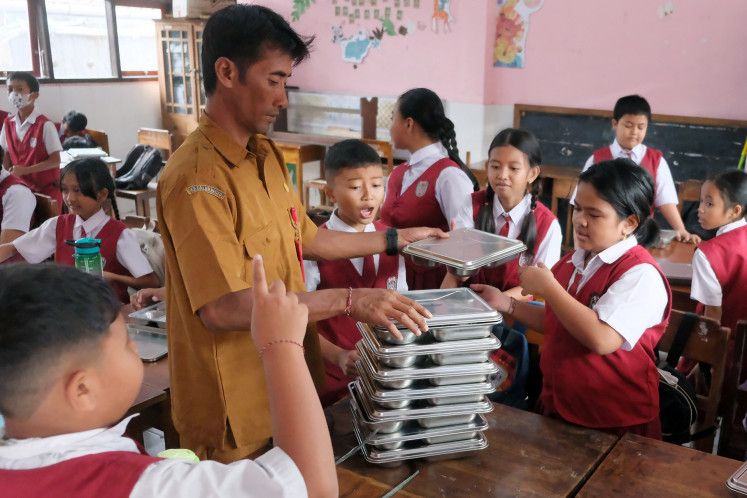Popular Reads
Top Results
Can't find what you're looking for?
View all search resultsPopular Reads
Top Results
Can't find what you're looking for?
View all search resultsBeing a golden girl in these very dark ages
The world seems to be focused on Ukraine, but there have been ongoing crises in Sudan, Syria, Somalia, Myanmar, Congo, Nigeria, Yemen, Ethiopia and Afghanistan.
Change text size
Gift Premium Articles
to Anyone
D
o you older readers remember the very popular American satirical comedy The Golden Girls, which ran between 1985-1992, featuring four women in their 50s and 60s? They were women with whole, complex characters defined by their personalities, jobs and adventures, who were proof that age is just a number.
What I loved about the TV series, besides it being hilariously entertaining, was that it was groundbreaking. It featured older women in a youth-centered industry, and dared to deal with controversial, sensitive and even taboo issues: race; sex; sexism; lesbian, gay, bisexual and transgender (LGBT) topics; aging; divorce; family; love and gender relations; poverty; homelessness; immigration; health care; HIV; addiction and even assisted suicide.
These are issues that we continue to face. For this reason, the series has attracted new fans in the 21st century due to its contemporary relevance.
On July 19, I turned 68, and therefore I, too, am a Golden Girl. Just like the Golden Girls in the sitcom, I also feel I continue to lead “a life full of adventure, humor and long stories of lives still being lived”, as the women in The Golden Girls were described in a 2021 documentary about them.
From my current vantage point, I have been able to do a life review and see things from a very different perspective. The people who were my devils and events that were my hell, I now see in a positive light, as agents of my growth and development that shaped me and were instrumental in making me wiser, more patient, more understanding and compassionate. Indeed, often your worst enemies can be your best teachers.
At the beginning of this year, I set up and became the director of the Gender and Democracy Center of the Institute for Social and Economic Research, Information and Publication (LP3ES) at age 67, after 50 years of being a freelancer. It was an existential change, but I accepted the challenge, as it would leverage the impact of my efforts, based on the work I had done as a scholar, and human rights and democracy activist for at least 30 to 40 years.
However, I am a Golden Girl in a Dark Age that is getting darker and darker. I often experience cosmic sadness when approaching a birthday, but this year it has been much more severe. And with reason.
In 1993, E.O. Wilson wrote an article asking, “Is Humanity Suicidal?”. Perhaps it wasn’t then, but now, it could very well be.
In a Monday article in The New York Times, in the face of record-breaking heat waves sweeping Europe, United Nations Secretary-General António Guterres warned that “half of humanity is in danger zone […] facing a collective suicide”, if things don’t change immediately.
Kristalina Georgieva, International Monetary Fund Managing Director, in her article “Facing Crisis Upon Crisis: How the World Can Respond”, which appeared on the IMF website on April 14, gives a long list of the multiple crises we are currently facing: the COVID-19 pandemic, the war in Ukraine, inflation, the fragmentation of global governance, the existential threat of climate change, food insecurity, job and learning loss (borne mainly by women and young people), hunger, poverty and conflict.
One paragraph in particular struck me: “In a world where war in Europe creates hunger in Africa; where a pandemic can circle the globe in days and reverberate for years; where emissions anywhere mean rising sea levels everywhere—the threat to our collective prosperity from a breakdown in global cooperation cannot be overstated”.
However, Georgieva did not mention racism, white supremacy, identity politics, violence, the rise of populism, the decline of democracy, gender discrimination, discrimination against religious and sexual minorities, the refugee crisis, displaced families, child marriage, child labor and trafficking.
The world seems to be focused on Ukraine, but there have been ongoing long-term crises in Sudan, Syria, Somalia, Myanmar, Congo, Nigeria, Yemen, Ethiopia and Afghanistan.
Recently we witnessed what happened as a result of an economic crisis – or collapse – in Sri Lanka, but Reuters reported earlier this week that a dozen other countries could go in the same direction: Lebanon, Suriname, Zambia, Argentina, Tunisia, Ghana, Egypt, Kenya, El Salvador, Pakistan, Belarus and Ecuador.
And have you heard of The Sixth Extinction: An Unnatural History? It’s a 2014 nonfiction book by Elizabeth Kolbert that argues that “the Earth is in the midst of a modern, man-made, sixth extinction”.
Goodreads summarizes the book thus: “Over the last half-billion years, there have been five mass extinctions, when the diversity of life on earth suddenly and dramatically contracted. Scientists around the world are currently monitoring the sixth extinction, predicted to be the most devastating extinction event since the asteroid impact that wiped out the dinosaurs. This time around, the cataclysm is us”.
Wow! But why not? We, too, are animal inhabitants of the world.
Kayleena Pierce-Bohen wrote in Screenrant in 2013 that “The Golden Girls have taken on an almost mythical presence in pop culture. Their strength and resilience through the trials and tribulations of their ‘golden years’ have made them patron saints of positivism, sassy role models to emulate when times are hard”.
In the context of our current seemingly apocalyptic scenario, what is a Golden Girl like myself supposed to do? Am I being foolishly idealistic and naive to think I can make a difference?
The fact of the matter is that we are going through an epochal change that occurs over decades and invariably involves chaos, violence and destruction. So what according to normal human logic makes no sense, in fact it may be simply the process of the regeneration of life, which has to go through the cycle of death and destruction.
How does a caterpillar become a butterfly? Through metamorphosis. The caterpillar eats and eats and grows enormously. When it is fully grown, it stops eating and becomes a pupa or chrysalis, a stage that lasts for a few weeks to two years. It looks like nothing is happening but the pupa is being destroyed to transform into a beautiful butterfly.
I know this sounds like an oversimplified simile, but perhaps the current chaos of the world can be likened to the process of the pupa becoming a butterfly. It’s clear that the world as we know it is no longer sustainable. The West is in suicidal decline, and indications are that it is time for the rise of the East, in other words, Asia. Who knows how long it will take, but probably no less than 15 to 20 years.
Does this mean we just sit back and do nothing? No, we can still be agents of change to create a new paradigm not based on greed and exploitation, but on co-operation and generosity – of spirit at least. I certainly don’t have all the answers, but I still intend to be a sassy and also spiritual Golden Girl!
Currently world leaders seem to be like “Tina”, a former household worker of mine who was always making bad life choices, which resulted in her being constantly sick and getting into bad relationships and situations. Like many world leaders, she blamed and attacked others.
Unfortunately, most people in the world are like Tina.
Let’s all try to be Golden Girls instead, whatever our ages!
***
The writer is the Director of the Gender and Democracy Center, LP3ES.

